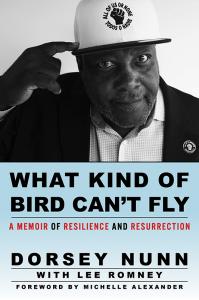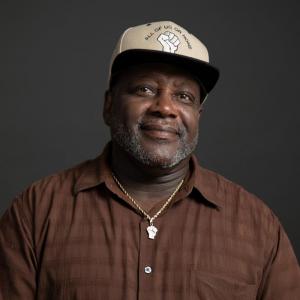A decade in prison became the catalyst for the nationwide movement Dorsey Nunn created to restore dignity and justice to the currently and formerly incarcerated
— Cornel West, philosopher and author of “Race Matters”
LOS ANGELES, CA, UNITED STATES, April 26, 2024 /EINPresswire.com/ — Dorsey Nunn began advocating for the rights of California prisoners and their families while incarcerated. Nunn emerged from San Quentin State Prison after ten years behind bars, radicalized by his experience and emboldened by the militant wisdom of the men he met there. For the last five decades, he has poured his heart and mind into liberating all those he left behind, building a nationwide movement to restore justice to millions of system-impacted Americans.
“What Kind of Bird Can’t Fly: A Memoir of Resilience and Resurrection” is his remarkable story from his upbringing in East Menlo Park, to lockdown in San Quentin, to finding his purpose and establishing a civil and human rights organization, to receiving the White House Champion of Change Award. Cowritten by Lee Romney, a former journalist for the “Los Angeles Times,” who covered Nunn’s work for over a decade, his memoir is slated for release on April 30, 2024, from Heyday Books.
“Like just about everyone I grew up with, I graduated from street thug to prisoner just in time to experience one of the most violent decades in California prison history,” says Nunn. “But this isn’t a prison memoir. And it’s not a personal redemption story, though I’ve done alright on that front. This book is about camaraderie, commitment, and grassroots organizing.”
As a co-founder of All of Us or None (AOUON), a nationwide civil and human rights organization, Nunn has led successful efforts to raise awareness around involuntary servitude behind bars, support families during and after incarceration, and dismantle employment and voting barriers for reentering individuals. His impactful initiatives include the development of the Elder Freeman Policy Fellowship, landmark legal victories such as the Ashker lawsuit that ended long-term solitary confinement in California, and policy wins like the passage of numerous Ban the Box laws at local, state, and federal levels. Additionally, Nunn’s advocacy contributed to ending the shackling of pregnant women and securing the largest drug sentencing reform in recent California legislative history (Senate Bill 180).
However, Nunn’s road to transforming his life and the lives of millions was fraught with struggle, loss, and grief, forged through his hard-fought battles with addiction, mental health challenges, and the constraints of toxic masculinity. His memoir gives readers an unfiltered look into not only his personal struggles but also the systemic issues of the prison industrial complex. While he paints a stark picture of what prison life was like, it isn’t “prison porn”; it’s a narrative of resilience, transformation, and the enduring power of forgiveness. Anchored throughout is Nunn’s commitment to combat systemic racism and to empower every human being coming out of cages to become the architects of their own liberation.
Political activist Angela Davis writes, “Whoever wants to assuage their doubts that radical change is possible—from the level of the individual to that of law, culture, and society—should make time to read Dorsey Nunn’s extraordinary memoir. Follow him and those with whom he makes community as they do the formidable work of transforming themselves, while fashioning a new world out of their tears and laughter where all—including those banished to prisons—are equally welcome.”
Nunn’s story underscores the importance of centering the voices of previously incarcerated people in the fight for meaningful reform, the power of coalition building among immigrants, men, women, working-class and poor people, and persistence in the face of punitive policy backlash.
ABOUT THE AUTHOR
Dorsey Nunn began advocating for the rights of California prisoners and their families while incarcerated. As co-director of Legal Services for Prisoners with Children (LSPC), in 2003 he co-founded All of Us or None (AOUON), a grassroots movement of formerly incarcerated people working on their own behalf to secure their civil and human rights. AOUON is now the policy and advocacy arm of LSPC, which Nunn has led as executive director since 2011. Collective victories include ending indefinite solitary confinement in California, expanding access to housing and employment for formerly incarcerated people, and restoring the vote to those on parole and probation.
Lee Romney spent twenty-three years as a reporter at the “Los Angeles Times,” where she developed expertise in criminal justice and mental health. She is currently collaborating with a former public defender on the podcast “November in My Soul.”
ABOUT THE BOOK
“What Kind of Bird Can’t Fly: A Memoir of Resilience and Resurrection” is an unfiltered look into Dorsey Nunn’s journey to restore dignity and justice to the currently and formerly incarcerated, following a decade spent in prison. Cowritten by Lee Romney, a former journalist for the “Los Angeles Times,” who covered Nunn’s work for over a decade, his story is slated for release on April 30, 2024, from Heyday Books.
MEDIA CONTACT
To request a copy of “What Kind of Bird Can’t Fly,” contact publicist Nanda Dyssou of Coriolis Company.
Nanda Dyssou
Coriolis Company
+1 424-226-6148
[email protected]
![]()
Originally published at https://www.einpresswire.com/article/706665151/a-leader-in-the-movement-for-prisoners-rights-shares-his-life-s-story-in-new-memoir-centering-solidarity-and-resistance





